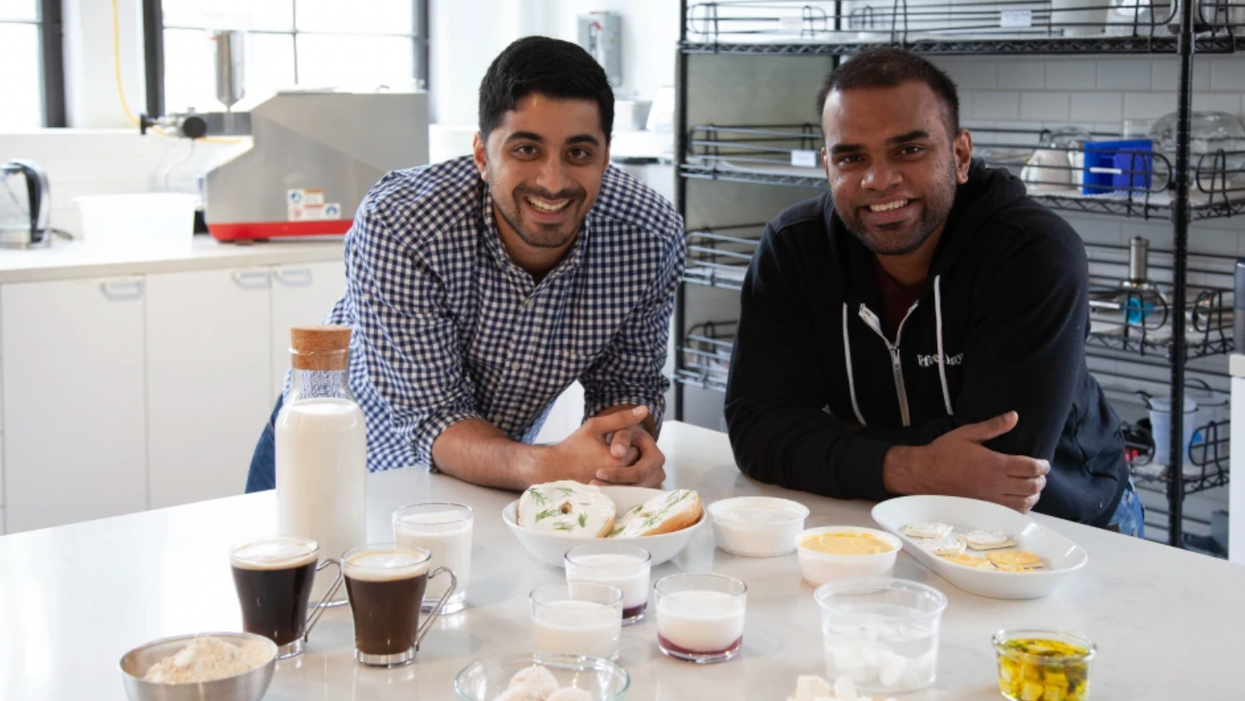Brand News
11 April 2022
Vegan brands offer an enticing alternative
Plant-based startups are creating meaty investment opportunities, writes PrivCo's The Daily Stack.

The cofounders of Perfect Day. (Image via Perfect Day)
Plant-based startups are creating meaty investment opportunities, writes PrivCo's The Daily Stack.

The cofounders of Perfect Day. (Image via Perfect Day)
This article originally appeared in The Daily Stack, a daily private market insights newsletter by PrivCo, a private company intelligence platform.
The man has been a public vegan since 1987 and continues to advocate for this environmental and ethical solution to a world devoted to animal consumption. When recently asked why he has been investing heavily in dairy and meat alternatives, he replied that nutritionally, rice and beans were the perfect food. Still, the key to turning meat-lovers into plant-based believers is providing meat-like options.
The foodtech industry seems to agree. Whether it's driven by a founder's principles of reducing greenhouse gas emissions caused by the meat industry (generating 60% of all food industry emissions) or a corporation eyeing green after BeyondMeat's 2019 IPO, we're looking at the latest in alternatives to animal products.
Campbell Soup Company CEO Mark Clouse offered thoughts on messaging amid inflationary shifts in consumer behavior.
After months of elevated inflation and interest rate hikes that have the potential to cool demand, consumers are showing more signs of shifting behavior.
It’s showing up in retail sales data, but there’s also evidence in the observations of the brands responsible for grocery store staples.
The latest example came this week from Campbell Soup Company. CEO Mark Clouse told analysts that the consumer continues to be “resilient” despite continued price increases on food, but found that “consumers are beginning to feel that pressure” as time goes on.
This shows up in the categories they are buying. Overall, Clouse said Campbell sees a shift toward shelf-stable items, and away from more expensive prepared foods.
There is also change in when they make purchases. People are buying more at the beginning of the month. That’s because they are stretching paychecks as long as possible.
These shifts change how the company is communicating with consumers.
Clouse said the changes in behavior are an opportunity to “focus on value within our messaging without necessarily having to chase pricing all the way down.”
“No question that it's important that we protect affordability and that we make that relevant in the categories that we're in," Clouse said. "But I also think there's a lot of ways to frame value in different ways, right?”
A meal cooked with condensed soup may be cheaper than picking up a frozen item or ordering out. Consumers just need a reminder. Even within Campbell’s own portfolio, the company can elevate brands that have more value now, even if they may not always get the limelight.
The open question is whether the shift in behavior will begin to show up in the results of the companies that have raised prices. Campbell’s overall net sales grew 5% for the quarter ended April 30, while gross profit margins held steady around 30%. But the category-level results were more uneven. U.S. soup sales declined 11%, though the company said that was owed to comparisons with the quarter when supply chains reopened a year ago and expressed confidence that the category is seeing a longer-term resurgence as more people cook at home following the pandemic. Snacks, which includes Goldfish and Pepperidge Farm, were up 12% And while net sales increased overall, the amount of products people are buying is declining. Volumes were down 7%.
These are trends happening across the grocery store. Campbell is continuing to compete. It is leading with iconic brands, and a host of different ways to consume them. It is following that up with innovation that makes the products stand out. Then, it is driving home messaging that shows consumers how to fit the products into their lives, and even their tightening spending plans.
Campbell Soup is more than 150 years old, and has seen plenty of difficult economic environments. It is also a different business today, and will continue to evolve. At the end of the day, continued execution is what’s required.
“If it's good food, people are going to buy it, especially if it's a great value,” Clouse said.